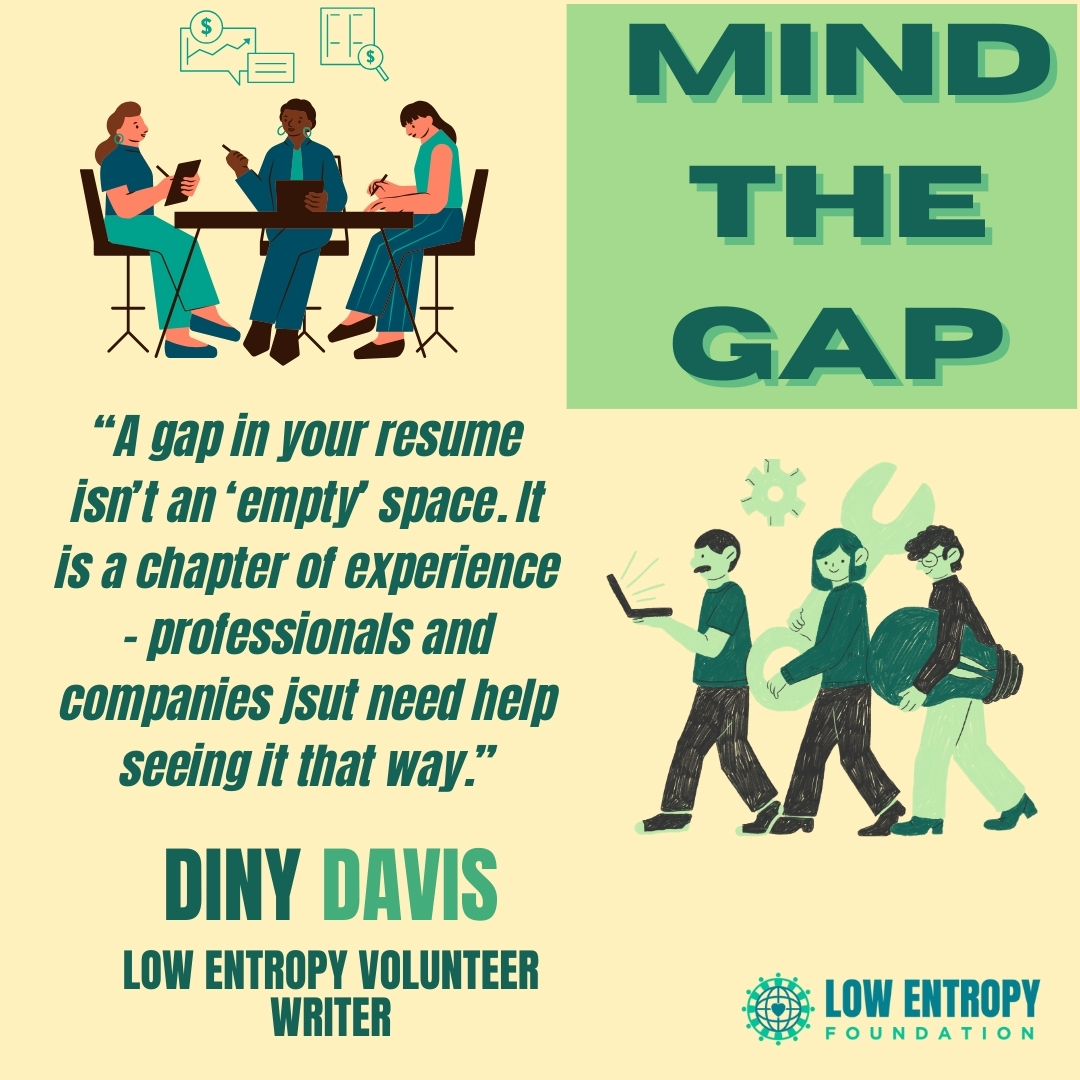Diny Davis (she/her/hers), Low Entropy Volunteer Writer
“My son, observe the postage stamp—its usefulness depends upon its ability to stick to one thing till it gets there.”- Unattributed quotation in the Elmira Gazette, December 1893
Imagine this: you’ve spent several years raising children, caring for a family member, recovering from an illness, pursuing further education or following a personal dream. Now, you’re eager to get back to work. But as you scan job postings and send out resumes, you keep hitting a wall—a career gap on your resume seems to scream louder than your qualifications.
You’re not alone. Many have discovered that finding work after a career break can be daunting, sometimes discouraging. In this article, let’s take a thoughtful look at why returning to work after a gap can be so tough, break down common hurdles, share practical strategies to get back on track and offer encouragement for anyone who feels lost between chapters.
Why Career Gaps Make Job Hunting Tough
The Disgrace Around Career Breaks
It’s an uncomfortable truth: even in today’s era of flexible careers, many employers still view work gaps skeptically. Hiring managers might assume your skills are outdated, and gaps can raise concerns about your commitment or adaptability. In today’s AI world, an automated resume screening software might filter you out before a human ever sees your application. A gap in your resume isn’t an “empty” space. It’s a chapter of experience—professionals and companies just need help seeing it that way.
Self-Doubt and Confidence Loss
Absence from the workplace can shake your confidence at a higher level. There are chances you may worry your skills have dulled. The thought that the language and pace of your industry may have shifted can make your return feel overwhelming. Networking might seem awkward and difficult when you don’t have a professional title or recent experience to share. Trust me, it’s normal to feel hesitant, but confidence can grow with preparation and practice.
Common Barriers: More Than Just the Gap
Automatic Filters and the Illusion of “Constant Progress”
Applicant tracking system hiring software (known as ATS) relies on set criteria—recent experience being one of them. If your resume doesn’t tick every box, you risk being rejected before you even get a chance to tell your story.
Societal Expectations and Internalized Pressure
Many people returning from a break struggle silently with internal pressure, feeling like they must explain or defend their gap in every conversation, which is overwhelming. They start comparing themselves to peers who never left the workforce, and fear of rejection can keep them from applying at all.
I strongly believe that rebuilding your career isn’t just about resumes and interviews—it’s about reshaping your own story, too.
Steps to Get Back in the Game
So, what can you do if you’re eager to restart your career after a gap? Here are practical, achievable strategies:
Refresh and Update Your Skills
Consider online courses, many of which are free or inexpensive. You can even try to attend workshops or webinars in your field, or any topic related to return to work. In the meantime, you can volunteer, freelance or participate in short-term projects to regain hands-on experience and references. It will help to sharpen your skills and boost your confidence.
Networking and Telling Your Story
Don’t underestimate the power of personal connections. Let friends, family and past colleagues know you’re looking. Attend (or even virtually participate in) industry meetups or local events. You can even prepare a brief, positive way to explain your gap, focusing on what you learned and how it prepares you for your next job.
Reworking Your Resume
Use a skills-based or functional resume format to highlight competencies over timeline. You need to focus on achievements and capabilities, not just the job titles. Clearly label your career break and describe any relevant activities (volunteering, caregiving, education, etc . . .) which made you learn and grow during your career break.
Employers Making a Difference
Some organizations have begun to recognize the value of career-break professionals.
- Returnship Programs: There are many paid internships or training roles designed specifically for those returning after a break.
- Remote Work Opportunities: There are flexible roles available that make the journey back to work very easy.
- Job Boards for Returnees: There are different sites that list roles specifically supporting people returning after a career break.
The workplace is slowly, but surely, waking up to value the career-break returnees who are passionate to restart their career.
Cultivating a New Mindset: the Power of Self-Compassion
It’s tempting to focus on what’s “missing” from your current resume. But perspective matters. Every life chapter builds new skills—resilience, adaptability, problem-solving and even emotional intelligence. Your career isn’t a straight line, and it’s okay to own your unique path.
Take the time to reflect on what you truly want next—not just what you think should do. You might discover new directions or opportunities that didn’t exist before your break, and find that you are ready to take a new path that will help you to learn and grow.
Reentering the workforce after a career gap is undeniably challenging—both because of constant disgrace and because of the inner challenges we face. But it’s also a journey of rediscovery, resilience and growth. A career gap doesn’t signal the end of your story. It’s simply the start of your next chapter.
—
Diny Davis is an aspiring author who is passionate about fitness and a strong believer in the close connection between physical and mental health. She is a journalism, psychology and literature graduate, a loving wife and a caring mother who maintains a balance in her work and personal lives while giving emphasis to self-care.


Well written…True facts! Continue the great work.